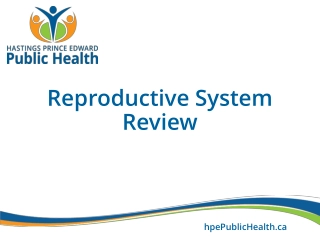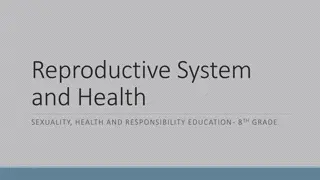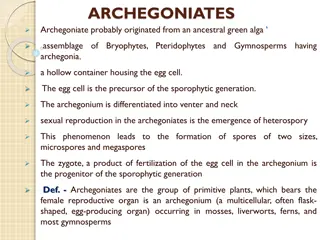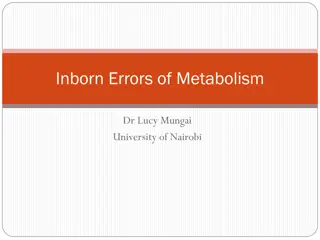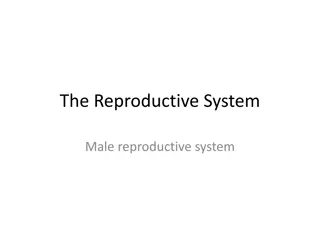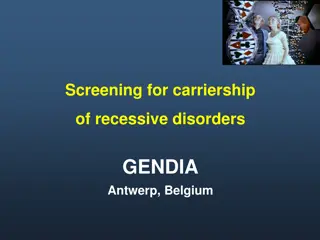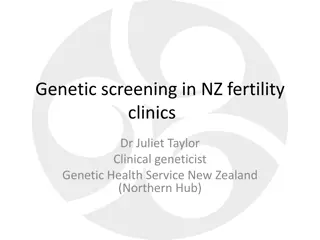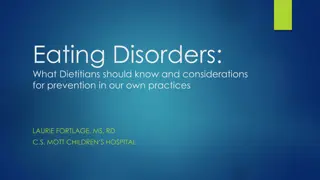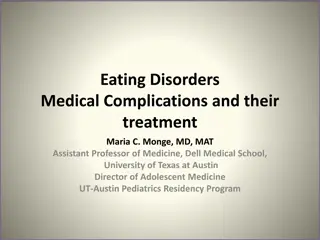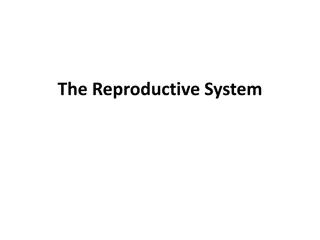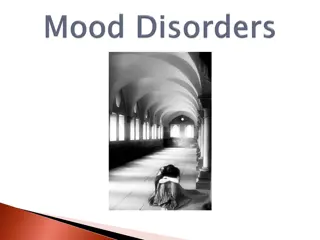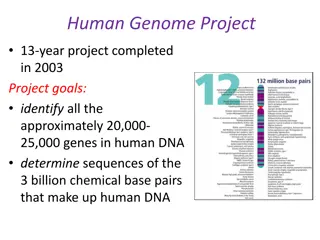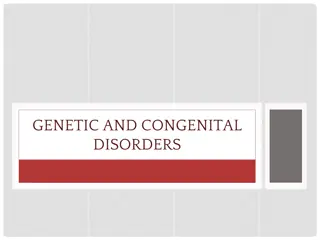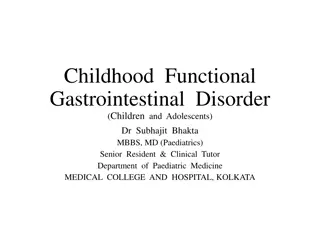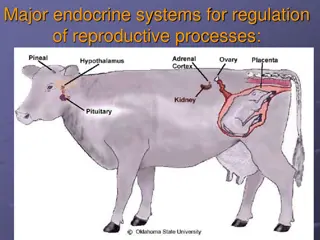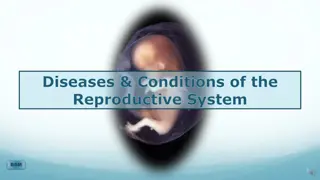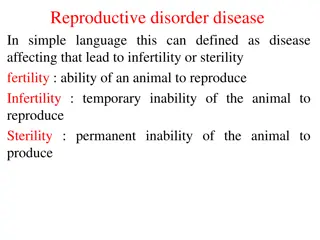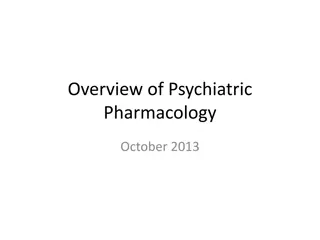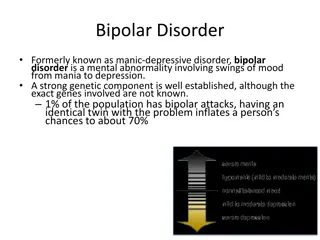Comprehensive Reproductive Health Review Materials
Explore a collection of informative and visually engaging images that cover various aspects of the reproductive system, menstrual cycle, and answer common questions related to sexual health. These resources are designed to enhance understanding and provide valuable insights into reproductive health
5 views • 7 slides
Male Reproductive Tract Anatomy in Animal Science
Explore the anatomy of the male reproductive system in animals, focusing on the testis, epididymis, bull reproductive organs, and more. Learn about the functions of the testes, sperm production, testosterone, and the structures involved in sperm delivery and storage. Detailed imagery and description
7 views • 40 slides
Understanding Reproductive Hormones in Males and Females
Reproductive hormones play crucial roles in the body, acting as chemical signals released by endocrine cells. In males, hormones like testosterone, gonadotropin, and estrogen regulate various functions related to reproduction. Similarly, in females, hormones like GnRH, FSH, and LH are essential for
6 views • 16 slides
Acupuncture for Fertility Enhancing Reproductive Health with Kerry Rutherford Acupuncture
Experience the transformative power of acupuncture for fertility with Kerry Rutherford Acupuncture. Our specialised treatments focus on enhancing reproductive health, offering a holistic approach to support your fertility journey. Through the gentle insertion of fine needles at strategic points, we
11 views • 8 slides
Understanding Sexual and Reproductive Anatomy in 5th Grade Lesson
Explore the sexual and reproductive anatomy in a 5th-grade lesson. Learn about the pituitary gland, its role in hormone production, why clothes may feel too small due to growth hormones, and the biological male and female reproductive systems. Discover the organs involved in reproduction and their f
6 views • 8 slides
Overview of Human Genetic Disorders
Human genetic disorders encompass a range of conditions, from recessive disorders like cystic fibrosis to dominant disorders such as Huntington's disease. Examples include cystic fibrosis, Huntington's disease, and sickle-cell anemia. Understanding genetic disorders involves research and awareness o
0 views • 10 slides
Understanding Reproductive Health and Sexuality Education in 8th Grade
Exploring the biological anatomy of both males and females, this educational content delves into the reproductive system, menstruation cycles, pregnancy, abstinence, and early pregnancy symptoms. It covers crucial topics such as sexual health, responsibility, and the importance of reproductive educa
0 views • 18 slides
Access to Reproductive Health Care for Parents with Disabilities
Empower parents and prospective parents with disabilities by providing access to reproductive health care through the Parents Empowering Parents initiative. Learn about disability rights laws, common accessibility barriers, and the importance of inclusive reproductive health care services. Gain insi
0 views • 17 slides
Overview of Anxiety and Related Disorders
Anxiety disorders, such as PTSD, panic disorders, phobias, agoraphobia, and OCD, are characterized by varying degrees of fear and distress. Anxiety is a normal response to danger, but when it becomes chronic, it can lead to debilitating conditions. PTSD occurs post-trauma, panic disorders involve in
1 views • 42 slides
Male Reproductive System Overview
The male reproductive system is responsible for producing and delivering fertile sperm, as well as regulating hormones like testosterone. It includes the scrotum, testes, ducts, and accessory glands. Important functions include spermatogenesis, thermoregulation, and supporting secondary sexual chara
1 views • 22 slides
Vertebrate Reproductive Strategies and Success Factors
Vertebrates exhibit various reproductive strategies to ensure reproductive success, such as external and internal fertilisation, ovipary, vivipary, and ovovivipary. The ultimate goal of each species is to maximize the number of surviving offspring while conserving energy. Different terminologies rel
1 views • 10 slides
Archegoniates: Primitive Plants with Unique Reproductive Structures
Archegoniates are a group of primitive plants believed to have originated from ancestral green algae. They possess distinct reproductive structures such as archegonia, which house the egg cell and give rise to the sporophytic generation. Heterospory in archegoniates leads to the formation of microsp
1 views • 15 slides
Understanding Somatic Symptom Disorders, Conversion Disorders, and Dissociative Disorders
Somatic symptom disorders manifest as physical symptoms without apparent cause, while conversion disorders involve specific physical symptoms incompatible with medical conditions. Illness anxiety disorder involves interpreting normal sensations as disease symptoms. Dissociative disorders lead to a s
1 views • 41 slides
NCVHS Subcommittee on Privacy Comments on HIPAA Privacy Rule for Reproductive Health Care
NCVHS Subcommittee on Privacy, Confidentiality, and Security provided comments on the Notice of Proposed Rulemaking (NPRM) to modify the HIPAA Privacy Rule for reproductive health care privacy. The NPRM aims to address concerns post-Dobbs ruling, introducing new provisions for prohibited uses and di
0 views • 13 slides
Understanding Sexual and Reproductive Health Rights in Nigeria
This presentation by Oby Nwankwo, Executive Director at CIRDDOC Nigeria, at the UN CEDAW Committee covers topics such as reproductive rights, status of women's health in Nigeria, HIV, contraception, maternal health, and the role of traditional leaders. It emphasizes the importance of sexual and repr
0 views • 55 slides
Understanding Inborn Errors of Metabolism and Metabolic Disorders
Inborn Errors of Metabolism (IEM) are genetic disorders that disrupt metabolic pathways, leading to substrate accumulation or product deficiency. These disorders can be classified based on toxic accumulation, protein metabolism, carbohydrate intolerance, lysosomal storage issues, energy production d
0 views • 29 slides
Understanding Co-occurring Mental and Physical Health Conditions
Co-occurring mental and physical health disorders are prevalent and require an integrative multidisciplinary approach for effective assessment and treatment. This holistic approach helps address the complexity of managing multiple disorders in an integrated healthcare setting. Through a multi-direct
1 views • 37 slides
Understanding the Male Reproductive System
The male reproductive system is a complex network involving gonads, ducts, and accessory glands that function to produce and transport sperm. Testes, the primary male gonads, play a crucial role in sperm production through a process called spermatogenesis. This system functions differently from the
1 views • 44 slides
Understanding Functional GI Disorders: A Comprehensive Overview
Functional GI disorders encompass a range of conditions affecting the gastrointestinal system, such as irritable bowel syndrome and disorders of the gut-brain interaction. These disorders are characterized by no structural abnormalities but are influenced by factors like motility disturbance, viscer
0 views • 42 slides
Genetic Carrier Screening for Recessive Disorders by GENDIA, Antwerp, Belgium
Explore the world of genetic carrier screening offered by GENDIA in Antwerp, Belgium. Learn about prenatal screening for various genetic disorders, including Down syndrome and severe monogenic disorders. Discover the frequency of common recessive disorders and the severity of genetic diseases. Uncov
0 views • 17 slides
Genetic Screening and Reproductive Carrier Testing in New Zealand Fertility Clinics
Genetic screening and reproductive carrier testing play crucial roles in identifying and managing genetic disorders in couples planning for pregnancy. While carrier screening is recommended for all couples, it is not widely followed in New Zealand. Pre-conceptual reproductive carrier screening is no
0 views • 19 slides
Understanding Genetic Disorders and Their Impact on Health
Genetic disorders are caused by abnormalities in genes or chromosomes, leading to various health conditions. Inherited disorders can be passed down from parents to children, affecting physical makeup and processes in the body. In India, there is a high prevalence of genetic disorders, particularly i
1 views • 12 slides
Understanding Eating Disorders: Types, Signs, Effects, and Recovery
Eating disorders are mental disorders characterized by unhealthy eating habits and can have severe physical and psychological consequences. This article explores the definition of eating disorders, signs to look out for, different types such as Anorexia Nervosa, Bulimia Nervosa, Pica, and Purging Di
0 views • 10 slides
Understanding Eating Disorders: Insights for Dietitians
Eating disorders are complex neurobiological conditions that are not merely about control or weight management. These disorders can affect individuals of all genders, body sizes, and socioeconomic backgrounds. Dietitians play a crucial role in identifying, assessing, and treating eating disorders, a
0 views • 41 slides
Understanding Eating Disorders: Medical Complications and Treatment
This presentation by Dr. Maria C. Monge covers the common eating disorders in teenage patients, potential medical complications, and the role of the medical team in treatment. It includes definitions of disorders like Anorexia Nervosa, Bulimia Nervosa, and Binge Eating Disorder according to DSM-5 cr
0 views • 60 slides
Understanding the Reproductive System: Terms, Disorders, and Procedures
Exploring the terminology, physiology, and common disorders related to the reproductive system, including definitions of key terms like amniotic sac, androgens, diploid cell, gamete, ovulation, and more. Learn about reproductive system disorders such as ectopic pregnancy, endometriosis, and menopaus
0 views • 9 slides
Understanding Neurodevelopmental Disorders in Childhood and Adolescence
Neurodevelopmental disorders in childhood and adolescence encompass a range of conditions including intellectual disabilities, communication disorders, autism spectrum disorder, and attention deficit/hyperactivity disorder. These disorders impact cognitive development, adaptive functioning, and comm
0 views • 30 slides
Understanding Sleep Disorders: Classification and Diagnosis
Sleep disorders encompass various conditions affecting sleep patterns and quality. They are classified into categories such as insomnia, sleep-related breathing disorders, central disorders of hypersomnolence, circadian rhythm sleep-wake disorders, parasomnias, and sleep-related movement disorders.
0 views • 32 slides
Understanding Grief and Depressive Disorders: A Comparative Analysis
Grief and depressive disorders share similarities but also have distinct differences. Grief is a universal emotional state following loss, while depressive disorders involve prolonged mood disturbances. The stages of grief include denial, anger, bargaining, depression, and acceptance, with intervent
0 views • 79 slides
Understanding Genetic Disorders and the Human Genome Project
The Human Genome Project, completed in 2003, aimed to identify all human genes and DNA sequences. Genetic disorders, like autosomal disorders and Huntington's disease, can result from mutations at different levels, affecting single genes, chromosomes, or multiple genes. Albinism and cystic fibrosis
0 views • 37 slides
Understanding Abnormal Psychology: Disorders, Symptoms, and Treatments
Explore the world of abnormal psychology through the lens of different disorders like depression, anxiety, and phobias. Learn about the definitions of abnormal behavior, DSM-V classifications, and various types of psychological disorders. Delve into the complexities of mental health conditions such
0 views • 39 slides
Overview of Classification of Psychiatric Disorders
Psychiatric disorders are illnesses with various manifestations that impact functioning due to disturbances in biological, social, genetic, and other factors. Two key classification systems, ICD-10 and DSM-5, categorize over 200 types of psychiatric illnesses. The ICD-10 includes categories like org
0 views • 18 slides
Overview of Genetic and Congenital Disorders and Their Causes
Explore the terminology, causes, characteristics, and results of genetic and congenital disorders, as well as the disorders of single-gene inheritance. Learn about autosomal dominant disorders like Marfan Syndrome and Neurofibromatosis. Discover how single-gene disorders are inherited and their impa
0 views • 24 slides
Understanding Childhood Functional Gastrointestinal Disorders
Functional Gastrointestinal Disorders (FGIDs) in children and adolescents are characterized by chronic or recurring symptoms that cannot be fully explained by current structural or biochemical tests. These disorders emphasize the role of normal development in symptom presentation and the lack of evi
0 views • 46 slides
Endocrine Systems in Reproductive Regulation
The endocrine system plays a crucial role in regulating reproductive processes by secreting hormones that influence cellular activity. This system involves ductless glands like the hypothalamus, pituitary gland, and other endocrine glands working together in a feedback mechanism. Hormones of various
0 views • 19 slides
Reproductive System Diseases and Conditions Overview
This comprehensive overview covers various diseases and conditions of the reproductive system, ranging from sexually transmitted infections like syphilis and gonorrhea to reproductive issues like ovarian cysts and infertility. It also discusses conditions such as pre-eclampsia and menopause. The inf
0 views • 7 slides
Ensuring Procreative Autonomy for Mentally Challenged Women in India
Women's reproductive rights are essential for upholding their human rights, yet the intersection of disabled women's right to reproductive freedom is often overlooked. Despite Indian laws governing reproductive rights, mentally challenged women face significant obstacles. It is crucial to involve th
0 views • 17 slides
Reproductive disorder disease
Reproductive disorders in animals can lead to infertility or sterility, affecting their ability to reproduce. Causes include congenital, hormonal, nutritional, infectious, and management factors. Congenital or hereditary causes may involve conditions like hermaphroditism, freemartin syndrome, and ov
0 views • 20 slides
Overview of Psychiatric Pharmacology: A Comprehensive Guide from 2013
This presentation delves into the nuances of psychiatric pharmacology, exploring common psychiatric conditions, historical perspectives on medical treatments, categories of psychiatric medications, and principles of treatment. It also touches on mental illness definitions from DSM-IV-TR and DSM-V, a
0 views • 27 slides
Understanding Mental Health Disorders: Bipolar Disorder, Anxiety Disorders, & More
Exploring various mental health disorders such as Bipolar Disorder, Anxiety Disorders, Generalized Anxiety Disorder, Panic Disorder, and Phobic Disorders. Learn about their symptoms, prevalence, and impacts on individuals' lives.
0 views • 41 slides
